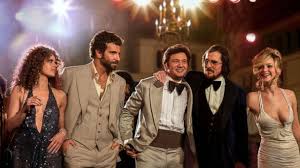By Armond White
David O. Russell goes to the 1970s to satirize contemporary Americana in American Hustle. If the title sounds both plain and pretentious, it takes a sense of humor like Russell’s to get over those hurdles and he does it with his new stock company of actors–great talents who are geeked up and wonderful playing roles of legitimate and government con artists.
Christian Bale (from Russell’s The Fighter) portrays Irving Rosenfeld, a Long Island dry cleaner who knows how to cheat folks based on their greed. At a licentious pool party, he meets Sydney Prosser (Amy Adams, The Fighter alumna) a hot-chick who defies the period’s feminist movement by capitalizing on her sex appeal. The duo’s swindles make them prey to an FBI agent, Richie DiMaso (Bradley Cooper from Silver Linings Playbook) who inveigles them in a sting against the mob and a New Jersey politician (Jeremy Renner, a Russell freshman) that flows over into Irving’s other life with his notice-me housewife Rosalyn (Jennifer Lawrence, Silver Linings valedictorian). Much of American Hustle’s pleasure comes from watching this cast in their most audacious performances yet play-out the farce of wannabe success.
 Each character is greedy–for money and recognition–but they’re also anxious to escape their roots. This is American entitlement in overdrive–not the suspect, nihilistic, hindsight of Paul Thomas Anderson’s The Master. Russell understands the urge to move ahead (the through-line of his previous films Spanking the Monkey, Flirting with Disaster, Three Kings, I Heart Huckabees). Every hustler has a con, each person desperately wants more. They are ridiculously authentic which gives them superior standing to Boogie Nights’ porno-pathos.
Each character is greedy–for money and recognition–but they’re also anxious to escape their roots. This is American entitlement in overdrive–not the suspect, nihilistic, hindsight of Paul Thomas Anderson’s The Master. Russell understands the urge to move ahead (the through-line of his previous films Spanking the Monkey, Flirting with Disaster, Three Kings, I Heart Huckabees). Every hustler has a con, each person desperately wants more. They are ridiculously authentic which gives them superior standing to Boogie Nights’ porno-pathos.
Russell’s stock company dances in these roles and his script (co-written with Eric Singer) gives them psychological choreography. The movie, while taking a detailed look at Americans’ desperation, feels like a party that acting classes will be talking about for years.
If there’s a downside to these festivities, it’s that Russell’s concept isn’t shapely; American Hustle is raggedly structured, as was Silver Linings Playbook. Russell resists going for the crowd-pleasing ecstasy that he instinctively seeks. But the ecstasy is also earned. Probing deeply into his characters insecurities (Irving’s horrible toupee, Sydney’s self-hatred, Richie’s self-doubt, Roslyn’s hunger), Russell neither patronizes nor condescends. The actors’ energetic exactitude makes one feel for them–and recognize them. This is the best example of improvisatory artistry since Robert Altman’s masterpieces and a Hollywood classic like Leo McCarey’s largely improvised 1937 The Awful Truth.
By facing the awful truth of American greed, Russell shows its concomitant feature, spiritual anxiety. That’s what keeps this movie fascinating. When Irving describes Sydney’s awesomeness, he says “Like me she had to reinvent herself” but “reinvent” is a 90s word, Stephen Holden coined it in a New York Times article proclaiming and institutionalizing a Madonna tour. And Russell understands how “reinvention” expresses contemporary American ambition–and American Hustle’s 70s story of the controversial ABSCAM sting operation draws a bead on American desperation. The actors provide emotional texture (note Amy Adams’ unstable yet calculating confession with con-artist accent unbidden and Lawrence‘s housework tizzy to a pop song) which makes it dazzlingly true to real-life experience in ways that this year’s The Place Beyond the Pines (like Boogie Nights) got insultingly wrong. Adams and Lawrence give the American female performances of the year.
Russell seems aware how recent pop cultural developments (GoodFellas, The Sopranos) misrepresented American ambition. He pays homage to those films but also corrects their emphasis on glorifying violence. American Hustle is GoodFellas, The Sopranos and Boogie Nights done right. It helps that Russell’s emotional amplitude includes female ambivalence rather than machismo. Adam’s Sydney says “My dream is to become anyone else than who I was” which is a confession Scorsese’s thugs could never admit–much less realize. The realization takes American Hustle past Scorsese’s superficial ethnic fantasy. Russell’s social acuity and funny profane language confronts a disturbing reality: “Maybe all you’ve got in life are fucked-up, poisonous choices.” Adams discloses this thought directly–as the most vulnerable idea any actor has had the privilege to emote in the past quarter-century. The same complexity is apparent in the subplot farce of Richie’s dealing with his boss (Louis CK) and Alessandro Nivola doing a Christopher Walken-voiced FBI agent. Russell knows how innocent-seedy American patriotism can be.
The depth and pleasure of this achievement allows movie-lovers to see themselves in American Hustle (the country’s visible past and emotional present). You could gaze into this affectionate funhouse mirror all day.
Follow Armond White on Twitter at 3xchair
